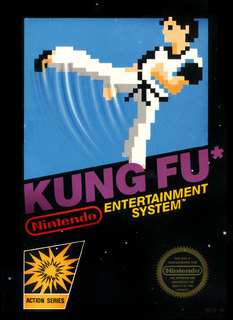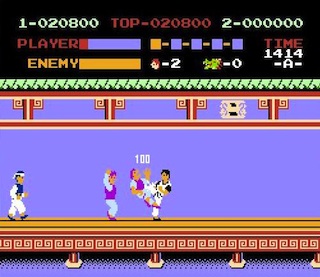
What's the deal? Kung Fu casts you as Thomas, and you're on a mission to save your girlfriend Sylvia from the clutches of the evil gang boss, Mr X. This involves walking your way through five levels of increasing difficulty to reclaim your woman and strike a blow for macho, insecure masculinity everywhere. The boring, video game fairy tale plot is simple, and so is the gameplay, but all the best games are easy to pick up. You just walk along and either punch and kick your enemies away. The standard goon just seeks to grab you in a hug, and your job is to batter them before they get close. Be sure these are manly hugs though, as they drain energy until you can shake them off. Other enemies feature knife throwers (two hits), dwarves (who sometimes leap up and bounce off your head), and falling pots containing snakes or fire breathing dragons. And don't forget about the bees on level four. Lastly, each level ends with a boss. The first is a stick-wielding hoodlum, the second a boomerang flinging footpad, the third a giant, the fourth a wizard with a detachable head, and then lastly the multi-moved Mr X himself.
Throughout you have three basic attack moves - a kick, a punch, and a flying kick. The latter is best deployed only against falling objects and bees, they're next to useless on enemies. Kick and punches are the staples. The kick has greater range, but a landed punch is worth double the score, and as you only receive an extra life after 50,000 points risking a bit more for close quarter fisticuffs is worth it. And, mercifully, each is mapped on to the controller's two buttons. The home computer versions had you toggling between the two by slapping the space bar. In short, Kung Fu is a game of timing first and reflex second. Just getting the time right to kick or punch an enemy isn't difficult, but it's a might bit trickier taking them on from both directions at once with a knife thrower, um, throwing knives at you. And the bosses aren't too difficult. Either getting in close and hammer away, hoping their energy bar runs down before what's left of yours, or moving in, hit, move out, rinse and repeat. This is really the only way Mr X can get taken down. There's very little hope of learning and avoiding their attacks.

On several occasions, we've explored game mechanics that were interesting additions to established conventions, but never really went anywhere. None of that can be said about Kung Fu. As a well received game on the NES, the home computers and in the arcades, I cannot think of a single aspect of this game that didn't become canonical for beat 'em ups. Scrolling levels guarded by an end of level boss? Multiple baddies and different baddy types? Different attacks? An end-of-game baddy with a move set as varied as your own? And, from a plot point perspective, kidnapping? Why, all of these are replicated in nearly every subsequent beat 'em up and perfected in the likes of Streets of Rage 2. Kung Fu therefore is not just a simple game worthy of a quick play through now and then, it's a canonical title that defined the basics of an entire genre.
No comments:
Post a Comment